- Home
- K. M. Ashman
The Warrior Princess Page 10
The Warrior Princess Read online
Page 10
‘Brynmore,’ panted Carwyn, as Maelgwyn ran over to join them. ‘I don’t know what you are doing here, but you have my gratitude.’
‘You didn’t think I was going to let you ride into this viper’s nest alone, did you?’
‘This fight is not yours to share. Our allegiance ended many years ago.’
‘Some allegiances last forever,’ said Brynmore. ‘But enough talk. Keep low and make your way to the street of bakers.’
‘Father,’ said Morgan, staring up the nearby hill. ‘The alarm has been raised. Look!’
All four men looked upwards and saw a column of horses streaming out of the castle gates. Carwyn looked towards Brynmore.
‘You just get to the horses,’ said the rebel, ‘and leave the English to us.’
‘But . . .’
‘My lord,’ said Brynmore, ‘there is no time to explain – just get yourself and the boys to safety. We will talk later.’ He gave Carwyn the sword he had taken from the man whose throat he had slit. ‘Now, be gone.’
Carwyn nodded and turned to Morgan and Maelgwyn. ‘You heard him. Keep your heads down and follow me. Stop for no man, friend or foe.’
The two young men nodded and Carwyn could see the fear on their faces. Neither had come so close to death before, and despite being trained in the way of weapons, this was the first time they had seen any used in anger. He bent down and retrieved a sword from a nearby dead soldier before throwing it over to Morgan.
‘Time to be a man, son,’ he said, ‘and don’t be afraid to use it.’ Without another word he ran from the shelter of the scaffold and across the square, dodging the dead and the wounded as he went. ‘Keep moving,’ shouted Carwyn, as an arrow just missed his head. ‘We’re almost there.’ Moments later he ducked into an alleyway, his two sons close behind him.
‘Morgan, you are wounded,’ he said, seeing blood running down his son’s arm.
‘A scratch only,’ gasped Morgan. ‘Keep going.’ Carwyn turned and made his way through the alleyways, trying to remember the street of bakers. Finally, he came to a side lane where the smell of baking bread assured him he was in the right place.
‘Down there,’ cried Maelgwyn, pointing at a waving man at the end of the lane.
Carwyn and his sons ran down and were relieved to see a row of saddled horses tied to a rail.
‘Take what you need,’ said the man, ‘and get to the Cantref Mawr.’
‘Who are you?’ asked Maelgwyn.
‘Ask no questions of those who help, son,’ said Carwyn, mounting one of the horses. ‘That way if you are ever caught and tortured, you can give away no information.’
Maelgwyn nodded and mounted his own horse.
‘Ride like the wind, my lord,’ said the man as he retreated into the shadows. ‘We need you alive.’ Seconds later he had disappeared into the maze of streets.
Carwyn turned to his sons. ‘Ready?’
‘Father,’ said Maelgwyn, ‘that is the second man to call you my lord. What is happening here?’
‘Nothing that you need concern yourself about,’ said Carwyn. ‘Now we have a hard ride ahead of us. We need to get going.’
‘No,’ said Maelgwyn as his father turned his horse to ride away.
‘Maelgwyn, do as you are told,’ snapped Morgan, ‘or we could all die here.’
‘Not until someone tells me what is going on,’ said Maelgwyn. ‘I have asked him over and over again yet he keeps me in the dark like an ill-tempered child.’ He glared at his father. ‘Well, he continued, ‘are you going to tell me or not?’
‘Tell you what?’
‘Why these men fight for you and why they call you lord?’
‘There is no time for this,’ said Carwyn. ‘Let’s get out of this place and we will talk later.’
‘No,’ started Maelgwyn again, and Carwyn was about to launch into a tirade when Morgan interrupted them both.
‘Just tell him,’ he shouted through his swollen mouth. ‘In the name of Christ, can’t you see? The time for such secrets is over, Father. He needs to know.’
Carwyn looked at his eldest son, still hesitating to reveal his secret, but before he could speak, Morgan took the option away from him.
‘Maelgwyn,’ he said, ‘our father is not the man you think he is. His name is Gruffydd ap Rhys and he is the last true prince of Deheubarth. That is why those men are risking their lives to save him.’
Maelgwyn stared at his father, slowly shaking his head. ‘No,’ he said. ‘It’s not true. The prince has been dead for many years.’
‘That man was not the prince,’ said Morgan. ‘The prince sits astride the horse before you. You are royal born, Maelgwyn. Our father is the prince of Deheubarth.’
Maelgwyn turned to Carwyn. ‘Is this true?’ he asked simply.
Carwyn looked across at his oldest son. Morgan had always known the truth but he had wanted to shield his three other sons from the threat such knowledge would surely bring. But Morgan was right: that luxury had now come to a sudden and violent end.
‘It is true,’ he said eventually. ‘And I promise to tell you everything. All I ask is we get away from here while we still can. Now, can we do that?’
Maelgwyn nodded silently, shocked at the revelation.
‘Good; now follow me.’ Carwyn turned his horse and rode it through the narrow streets, heading towards the outskirts of the town. Behind him was Morgan, his aching body crying out at every jolt of the horse, and bringing up the rear was Maelgwyn, his mind ablaze at his father’s revelation. If it was true, and at the moment he wasn’t sure it was, then his father was one of the most notorious rebel leaders ever to raise a sword against the English: Gruffydd ap Rhys, more commonly known as Tarw, the Bull of Wales.
Pembroke Castle
December 20th, AD 1135
Nesta and Emma sat at a table in the Princess’s chambers, both sewing small tapestries held in wooden frames. For the past hour or so they had talked quietly, picking on dried fruit and reminiscing about the days before the English had established such a stranglehold over the whole of the south.
‘Remember when young Henry put a mouse beneath my bed covers?’ said Emma, lowering her sewing. ‘I thought I would truly die that night.’
‘Oh, yes,’ said Nesta with a laugh, ‘and the time he placed a rotting sheep’s head in Lady Elspeth’s window.’
‘He was so naughty,’ said Emma with a sigh, ‘yet so loveable. I do miss him so.’
Nesta smiled and put her sewing down on the table alongside Emma’s. ‘I do, too,’ she said. ‘I always knew his place was at court, but it still wasn’t easy to see him go.’
‘Do you hear from him?’
‘Not much. I have the occasional letter but apart from that I think he finds the wonders of Westminster too distracting for such simple pastimes and, besides, the palace is far more comfortable than the draughty walls of a wooden Welsh castle.’
‘Don’t you mean English?’
‘It was Welsh long before Gerald and his men claimed it for the Crown all those years ago, Emma, and though the fortress that once stood upon this site bore little resemblance to what it is now, to me, it will always be a part of our heritage. I am Welsh and, despite what you may think, my allegiances are always with my people.’
‘I have often wondered how you make that work, my lady.’
‘What do you mean?’
‘Well, you make no secret about your passion for your heritage, yet here you are, married to an English knight, the mother of two of his sons and also the mother to the bastard son of an English king. It seems quite a situation to be in for someone who professes to hate the Crown so much.’
‘I hate the thought of the Crown,’ replied Nesta. ‘I hate the thought of my people being oppressed and I hate the thought of never walking these hills again without armed bodyguards at my back. What I don’t hate is any individual who is just as much a victim of the situation as I am. I include Gerald in this stance, for though he was not my first choice a
s a husband and I know it was no more than a political arrangement, he has forgiven me more than any man should ever have to. We both love our sons and Gerald has brought Henry up as if he were his own. No mother could have asked for more, and though he represents a system I hate, he is not responsible for that system.’
‘Do you love him?’
Nesta hesitated, shocked at the bluntness of the question.
‘Your hesitation speaks for you,’ said Emma.
‘On the contrary,’ replied Nesta. ‘I was just taken aback and it is a very difficult question. I never used to but, now, I think I do. I would certainly never do anything to hurt him and he has my undivided loyalty for as long as I am his wife.’
‘But what if that situation should come to an end?’
‘What do you mean?’
‘It is a dangerous world out there, my lady, and the master has many enemies. Surely it has crossed your mind that one day he may fall foul of an assassin’s blade, or even fall in battle.’
‘I hope that day never comes, Emma.’
‘As do I, for he has always been kind to me, but if it does, who will demand your loyalty then?’
Nesta stared at the maid for several moments. For a woman with no education, Emma was very astute politically. ‘All I will say, Emma,’ she said eventually, ‘is that if I am ever widowed, then any loyalty I had to Gerald will come to a natural end and any subsequent actions will be to suit my own mind, not the minds of others, be they a pauper or a king. I am older and wiser than the girl they sent to Westminster all those years ago; if I had known then what I know now, I probably would not be sitting within this keep talking about what might have been.’
‘Where do you think you would be?’ asked Emma.
Nesta took a deep breath and turned her head slowly to the window. ‘I’m not sure,’ she said eventually, ‘but I do know this. It would be somewhere out there with the wind in my hair, the sun on my face and with freedom in my heart. With those three things, Emma, I would be the richest and happiest woman in the world.’
The maid smiled and reached out to take her mistress’ hands. ‘Who knows, my lady, there may yet come a day in our lifetime when all three will be yours to enjoy.’
For a few moments both women sat in silence, each dreaming of their own versions of freedom.
‘Anyway,’ said Nesta suddenly, ‘enough of such nonsense. I have to see the steward and my husband about the new tapestry. Could you clear this away and I’ll see you at the meal this evening?’
‘Of course, my lady,’ said Emma, and as the maid started to clear away the sewing, Nesta headed out of her room and down the keep stairway.
In the lesser hall, the steward was talking quietly to the treasurer while Gerald sat at a table placed near the fire. Upon the table was a leather bag containing dispatches from London. His face creased with concern as he read one in particular. The door to the hall opened and Nesta walked in.
‘Nesta,’ said Gerald, looking up. ‘Forgive me. I forgot we were supposed to be meeting. I believe you want to commission a new tapestry for the wall of the great hall, is that true?’
‘It is,’ said Nesta, seeing the strain upon her husband’s face, ‘but if it is a bad time, we could discuss it later.’
Gerald sighed and rubbed his eyes.
‘It would help, if you don’t mind.’
‘Is there something I can do?’ asked Nesta.
‘Not this time,’ replied Gerald. ‘Some of these matters are beyond even my influence.’
‘Such as?’
‘Well, for one, it looks like the succession may not go ahead as we thought. Stephen de Blois is already in London, and it seems he has the support of the nobles and many of the bishops for his claim to the throne.’
‘And what do you think of this?’
‘I admit that the thought of a queen on the throne is a strange one but Matilda is a strong woman. Stephen, on the other hand, is reputed to be weak and perhaps that is not what England needs at the moment. Whatever the outcome, it is out of my hands.’
Nesta sat on the second chair and reached out to take her husband’s hand. ‘You look tired and should take some rest.’
‘I can’t,’ said Gerald. ‘I have to ride to Kidwelly as soon as possible and speak to Maurice de Londres about the growing Welsh threat.’
‘You talk of Hywel ap Maredudd?’
‘Aye. It is no secret that he has recruited an army in Brycheniog and I can only assume he does so with the intention of turning his forces upon the Crown. The threat is real and we have to prepare. Between us, Maurice and I can muster a formidable force but the numbers are spread out over too great an area and we need to coordinate our response.’
‘The burdens of office are indeed great,’ said Nesta.
Before Gerald could answer, the far doors of the hall burst open and one of the guards ran in unannounced.
‘What is this?’ started the steward, annoyed at the intrusion.
‘My lord,’ shouted the guard, ignoring the steward, ‘the alarm has been sounded. Our men are under attack in the town.’
Several hours later, Gerald paced back and forth in the hall, his face a picture of controlled rage. To one side stood Salisbury, the man responsible for the debacle that had unfolded throughout the day, and the sergeant-at-arms who had led the counteroffensive against the rebels. Nesta stood at the back of the hall, alongside the castle steward, both watching with concern as the two men were questioned by the castellan.
‘So,’ said Gerald, as he walked, ‘let’s be clear about this, what you are saying is that during a completely legal execution, carried out in the name of the king, a band of unknown rebels attacked the execution party and released the prisoners from their bonds.’
‘Only one of them, my lord,’ said Salisbury. ‘The rest were hanged as ordered.’
‘If that is the case, why am I getting reports that there were two men released from the scaffold, both of whom made a clean escape?’
‘The second man was not on the original list of condemned men, my lord. He was arrested only today and summarily condemned to death on the charges of brigandry against the Crown.’
‘On whose authority?’
‘On my authority, as vested in me by my position as Constable of Pembroke.’
‘And do you have evidence of this man’s guilt or are we nothing more than the barbarians that the Welsh already think we are?’
‘I had a confession from the man himself,’ said Salisbury, ‘witnessed by many of our own men as well as some of the peasants around the scaffold.’
‘So, you are telling me this man just walked up of his own free will and declared himself a rebel in order to be hanged. Why would he do that?’
‘To save his son, my lord. One of the condemned men to be executed.’
‘It still doesn’t make sense.’
‘He offered himself in his son’s place, but I arrested him upon his confession and intended to hang them both.’
‘But what made him think you would free his son?’
Salisbury glanced at Nesta at the far end of the hall. ‘My lord, perhaps we could talk in private. There are matters that should stay between us only.’
Gerald followed his gaze before turning his attention back upon the constable. ‘Nesta is both my wife and confidante, Master Salisbury. You can say what you have to say in front of her.’
‘My lord,’ said Salisbury, ‘as Constable of Pembroke and in the interests of security I respectfully demand a private audience.’
‘Master Salisbury,’ shouted Gerald, ‘at the moment you are in no position to demand anything. As far as I can see you are responsible for the deaths of ten of my men, another six grievously wounded and the release of two brigands whose heads should already be on spikes above the gate. Now, if you don’t want to be charged with incompetence and possibly lose your very profitable station within this castle I suggest you start explaining yourself immediately.’ Gerald paused and took a deep breath
before continuing. ‘So, I will ask you again. What did this mysterious man who confessed his crimes possibly offer that made him think you would grant his request?’
Salisbury paused and with another glance towards Nesta, raised himself up to his full height. ‘My lord,’ he announced, ‘he told me he was the rebel prince of Deheubarth, Gruffydd ap Rhys.’
Gerald stared at Salisbury in silence, unsure what to make of his constable’s last statement. Behind him, Nesta’s eyes widened at the mention of her brother’s name and she walked over to stand beside her husband, keen to hear more. Gerald’s eyes narrowed as the information sunk in and Salisbury swallowed hard, realising how absurd his last statement must sound.
‘Let me get this clear,’ said Gerald eventually. ‘You are telling me that some unknown vagrant came up to you out of nowhere and calmly announced he was one of the most wanted men across the south of the country.’
‘Yes, my lord.’
‘A man,’ continued Gerald, walking around the constable, ‘who has been dead for many years and whose body was clearly identified as being the one we sought.’
‘I know it sounds absurd,’ said Salisbury, ‘but he told me his death had been faked for the sake of his family.’
‘And you believed him?’
‘It matters not, my lord, the very fact that he was admitting to being a rebel gave me the authority to pass instant sentence upon him, as well you know.’
‘You may be correct in that sense,’ said Gerald, ‘but I am keen to understand what it was that made you think he was telling the truth, prince or no prince.’
‘My lord,’ answered Salisbury, ‘any man who offers his life in the place of one about to die has an air of believability about him. He was honest in his manner and was desperate to save the life of his son.’
‘Which prisoner was this?’ asked Gerald.
‘The one who was captured on your campaign against the rebels.’
‘The one who worked at the manor at Llandeilo?’

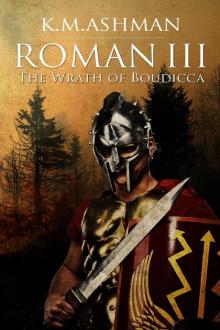 The Wrath of Boudicca
The Wrath of Boudicca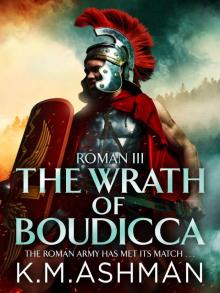 The Rise of Caratacus
The Rise of Caratacus Vampire
Vampire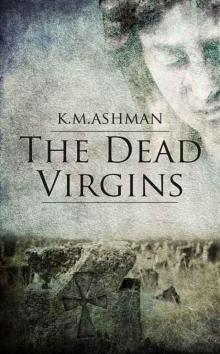 The Dead Virgins (The India Sommers Mysteries Book 1)
The Dead Virgins (The India Sommers Mysteries Book 1)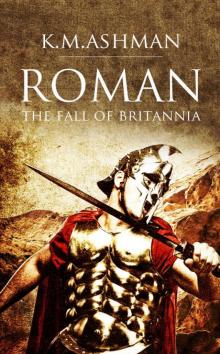 Roman - The Fall of Britannia
Roman - The Fall of Britannia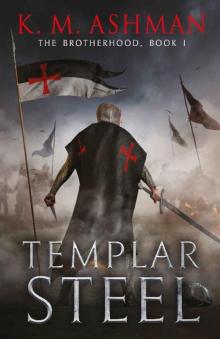 Templar Steel
Templar Steel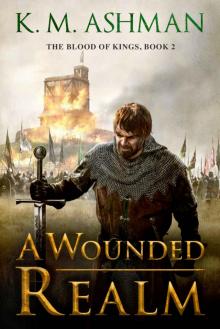 A Wounded Realm
A Wounded Realm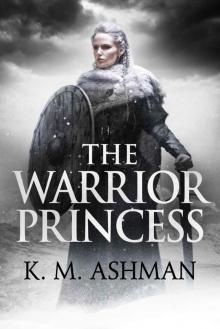 The Warrior Princess
The Warrior Princess